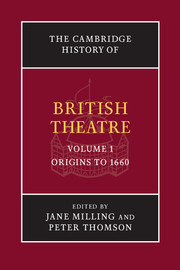Book contents
- Frontmatter
- PART I PRE-ELIZABETHAN THEATRE
- PART II ELIZABETHAN THEATRE
- PART III JACOBEAN AND CAROLINE THEATRE
- 13 Working playwrights, 1580–1642
- 14 Theatre and controversy, 1603–1642
- 15 The Stuart masque and its makers
- 16 Clowns, fools and knaves: stages in the evolution of acting
- 17 Thomas Middleton's A Game at Chess: a case study
- 18 The condition of the theatres in 1642
- 19 Theatre and Commonwealth
- Works Cited
- Index
- References
13 - Working playwrights, 1580–1642
from PART III - JACOBEAN AND CAROLINE THEATRE
Published online by Cambridge University Press: 28 March 2008
- Frontmatter
- PART I PRE-ELIZABETHAN THEATRE
- PART II ELIZABETHAN THEATRE
- PART III JACOBEAN AND CAROLINE THEATRE
- 13 Working playwrights, 1580–1642
- 14 Theatre and controversy, 1603–1642
- 15 The Stuart masque and its makers
- 16 Clowns, fools and knaves: stages in the evolution of acting
- 17 Thomas Middleton's A Game at Chess: a case study
- 18 The condition of the theatres in 1642
- 19 Theatre and Commonwealth
- Works Cited
- Index
- References
Summary
If a complete list of playwrights for the commercial stage from 1580 to 1642 were to be discovered in a London archive, few students of early English drama would recognise many of the names. Until the mid 1580s, most commercial drama was written by players for their companies; while there are some lists of players in this period, there are no lists of those players who were also dramatists. After 1585 players continued to supply companies with plays: for example, Richard Tarlton, Robert Wilson, Robert Armin, Samuel Rowley, Charles Massey and Nathan Field. A few players became known chiefly as playwrights: William Shakespeare, Benjamin Jonson and Thomas Heywood. By the late 1580s there were also authors who devoted a significant part of their time to playwriting. Many came to London from the provinces (Robert Greene, John Day, John Fletcher); some were Londoners born (Thomas Dekker, James Shirley). Many had fathers in trade (Thomas Kyd, scrivener; Anthony Munday, draper), some were themselves members of guilds (Henry Chettle, stationer), and some were of gentle birth (Francis Beaumont). Many acquired a university education (George Peele, Oxford; Christopher Marlowe, Cambridge); some continued to an Inn of Court (John Marston and John Ford, Middle Temple). In Palladis Tamia , or Wits Treasury (1598), praising those authors best in tragedy and comedy, Francis Meres cuts across lines of class, education, commercial venue and professional commitment to include the player Wilson, the provincial Greene, the Londoner Dekker, the tradesman's son Kyd and the university graduate Marlowe, along with men with modest vitas such as Richard Hathaway and Henry Porter.
- Type
- Chapter
- Information
- The Cambridge History of British Theatre , pp. 339 - 363Publisher: Cambridge University PressPrint publication year: 2004

